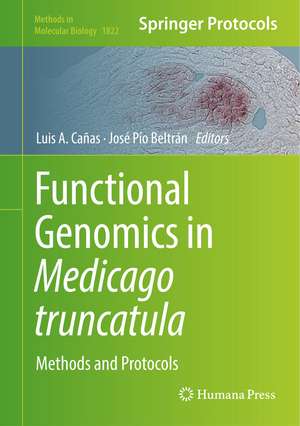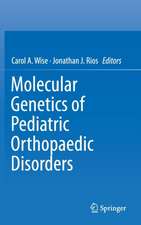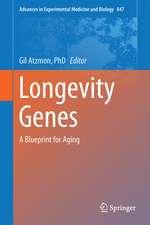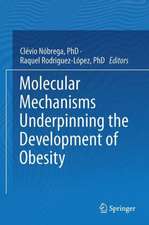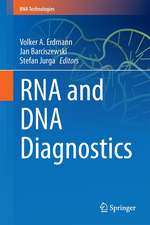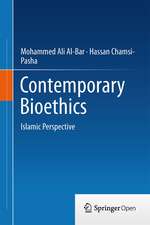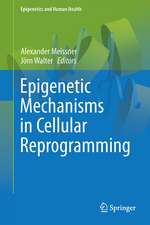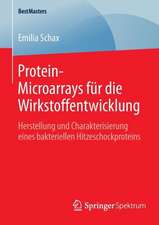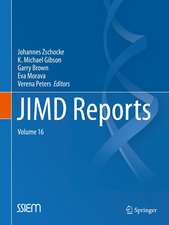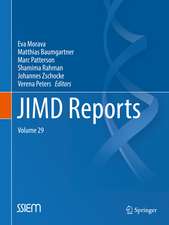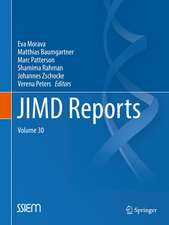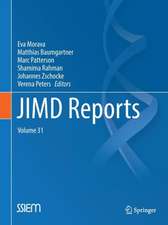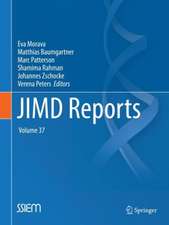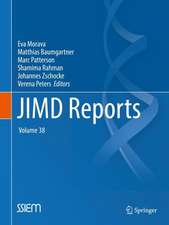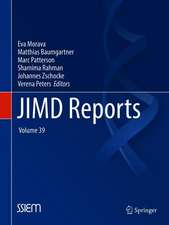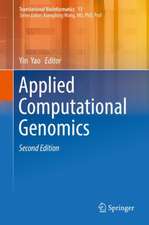Functional Genomics in Medicago truncatula: Methods and Protocols: Methods in Molecular Biology, cartea 1822
Editat de Luis A. Cañas, José Pío Beltránen Limba Engleză Hardback – 25 iul 2018
Cutting-edge and thorough, Functional Genomics in Medicago truncatula: Methods and Protocols is a valuable resource for anyone interested in learning more about this developing field.
| Toate formatele și edițiile | Preț | Express |
|---|---|---|
| Paperback (1) | 587.17 lei 38-44 zile | |
| Springer – 10 dec 2019 | 587.17 lei 38-44 zile | |
| Hardback (1) | 958.88 lei 6-8 săpt. | |
| Springer – 25 iul 2018 | 958.88 lei 6-8 săpt. |
Din seria Methods in Molecular Biology
- 9%
 Preț: 791.59 lei
Preț: 791.59 lei - 23%
 Preț: 598.56 lei
Preț: 598.56 lei - 20%
 Preț: 882.95 lei
Preț: 882.95 lei -
 Preț: 252.04 lei
Preț: 252.04 lei - 5%
 Preț: 802.69 lei
Preț: 802.69 lei - 5%
 Preț: 729.61 lei
Preț: 729.61 lei - 5%
 Preț: 731.43 lei
Preț: 731.43 lei - 5%
 Preț: 741.30 lei
Preț: 741.30 lei - 5%
 Preț: 747.16 lei
Preț: 747.16 lei - 15%
 Preț: 663.45 lei
Preț: 663.45 lei - 18%
 Preț: 1025.34 lei
Preț: 1025.34 lei - 5%
 Preț: 734.57 lei
Preț: 734.57 lei - 18%
 Preț: 914.20 lei
Preț: 914.20 lei - 15%
 Preț: 664.61 lei
Preț: 664.61 lei - 15%
 Preț: 654.12 lei
Preț: 654.12 lei - 18%
 Preț: 1414.74 lei
Preț: 1414.74 lei - 5%
 Preț: 742.60 lei
Preț: 742.60 lei - 20%
 Preț: 821.63 lei
Preț: 821.63 lei - 18%
 Preț: 972.30 lei
Preț: 972.30 lei - 15%
 Preț: 660.49 lei
Preț: 660.49 lei - 5%
 Preț: 738.41 lei
Preț: 738.41 lei - 18%
 Preț: 984.92 lei
Preț: 984.92 lei - 5%
 Preț: 733.29 lei
Preț: 733.29 lei -
 Preț: 392.58 lei
Preț: 392.58 lei - 5%
 Preț: 746.26 lei
Preț: 746.26 lei - 18%
 Preț: 962.66 lei
Preț: 962.66 lei - 23%
 Preț: 860.21 lei
Preț: 860.21 lei - 15%
 Preț: 652.64 lei
Preț: 652.64 lei - 5%
 Preț: 1055.50 lei
Preț: 1055.50 lei - 23%
 Preț: 883.85 lei
Preț: 883.85 lei - 19%
 Preț: 491.88 lei
Preț: 491.88 lei - 5%
 Preț: 1038.84 lei
Preț: 1038.84 lei - 5%
 Preț: 524.15 lei
Preț: 524.15 lei - 18%
 Preț: 2122.34 lei
Preț: 2122.34 lei - 5%
 Preț: 1299.23 lei
Preț: 1299.23 lei - 5%
 Preț: 1339.10 lei
Preț: 1339.10 lei - 18%
 Preț: 1390.26 lei
Preț: 1390.26 lei - 18%
 Preț: 1395.63 lei
Preț: 1395.63 lei - 18%
 Preț: 1129.65 lei
Preț: 1129.65 lei - 18%
 Preț: 1408.26 lei
Preț: 1408.26 lei - 18%
 Preț: 1124.92 lei
Preț: 1124.92 lei - 18%
 Preț: 966.27 lei
Preț: 966.27 lei - 5%
 Preț: 1299.99 lei
Preț: 1299.99 lei - 5%
 Preț: 1108.51 lei
Preț: 1108.51 lei - 5%
 Preț: 983.72 lei
Preț: 983.72 lei - 5%
 Preț: 728.16 lei
Preț: 728.16 lei - 18%
 Preț: 1118.62 lei
Preț: 1118.62 lei - 18%
 Preț: 955.25 lei
Preț: 955.25 lei - 5%
 Preț: 1035.60 lei
Preț: 1035.60 lei - 18%
 Preț: 1400.35 lei
Preț: 1400.35 lei
Preț: 958.88 lei
Preț vechi: 1169.36 lei
-18% Nou
Puncte Express: 1438
Preț estimativ în valută:
183.50€ • 190.49$ • 153.01£
183.50€ • 190.49$ • 153.01£
Carte tipărită la comandă
Livrare economică 22 martie-05 aprilie
Preluare comenzi: 021 569.72.76
Specificații
ISBN-13: 9781493986323
ISBN-10: 1493986325
Pagini: 308
Ilustrații: XI, 343 p. 45 illus., 35 illus. in color.
Dimensiuni: 178 x 254 mm
Greutate: 0.83 kg
Ediția:1st ed. 2018
Editura: Springer
Colecția Humana
Seria Methods in Molecular Biology
Locul publicării:New York, NY, United States
ISBN-10: 1493986325
Pagini: 308
Ilustrații: XI, 343 p. 45 illus., 35 illus. in color.
Dimensiuni: 178 x 254 mm
Greutate: 0.83 kg
Ediția:1st ed. 2018
Editura: Springer
Colecția Humana
Seria Methods in Molecular Biology
Locul publicării:New York, NY, United States
Cuprins
Grain and forage legumes: nutritional value and agriculture sustainability.- Model legumes: functional genomics tools in Medicago truncatula.- The Medicago truncatula genome: genomic data availability.- Physical mutagenesis in Medicago truncatula using Fast Neutron Bombardment (FNB) for symbiosis and developmental biology studies.- Targeting Induced Local Lesions IN Genomes (TILLING) in Medicago truncatula.- T-DNA insertional mutagenesis and activation tagging in Medicago truncatula.- Tnt1 Insertional Mutagenesis in Medicago truncatula.- Transient post-transcriptional gene silencing in Medicago truncatula: Virus-Induced Gene Silencing (VIGS).- Stable inactivation of microRNAs in Medicago truncatula roots.- Non-isotopic RNA in situ hybridization for functional analyses in Medicago truncatula.- In situ hybridization method for localization of mRNA molecules in Medicago tissue sections.- Editing the Medicago truncatula genome: targeted mutagenesis using the CRISPR-Cas9 reagent.- Functional genomics and seed development in Medicago truncatula: an overview.- Functional genomics and genetic control of compound leaf development in Medicago truncatula: an overview.- Root development in Medicago truncatula: lessons from genetics to functional genomics.- The multiple faces of the Medicago-Sinorhizobium symbiosis.- Functional genomics and flowering time in Medicago truncatula: an overview.- Functional genomics and genetic control of flower and fruit development in Medicago truncatula: an overview.- Towards unravelling the genetic determination of the acquisition of salt and osmotic stress tolerance through in vitro selection in Medicago truncatula.- Functional genomics in the study of metabolic pathways in Medicago truncatula: an overview.
Notă biografică
Dr. Luis A. Cañas is a Staff Scientist of The Spanish National Research Council (CSIC) at the Institute for Plant Cell and Molecular Biology (IBMCP) of Valencia. While working in the Plant Molecular Biology Dep. at the University of Georgia (Athens, USA), he evaluated the use of floral-specific monoclonal antibodies as molecular markers to study floral organ development. On his return to Spain, he was firstly working at the Biological Research Center (CIB, CSIC) in Madrid and finally he became staff scientist of the CSIC at the IBMCP. Work in his lab is focused in the study of the MADS-box regulatory genes involved in floral organ development in legumes, using Medicago truncatula as model system and integrating molecular evolution approaches to determine their mode of evolution after duplication.
Dr. José Pío Beltrán is Professor of The Spanish National Research Council (CSIC) at the Institute for Plant Cell and Molecular Biology (IBMCP) of which he wasthe founder. While working at the Max Planck Institute für Züchtungsforschung (Köln, Germany) he isolated the gene Deficiens from Antirrhinum majus, the first floral organ identity homeotic gene to be discovered. He has been investigating for more than thirty years on floral and fruit development in legumes, especially in Medicago truncatula. He has been the President of the Federation of European Societies of Plant Biology (FESPB) as well as the President of the European Plant Science Organization (EPSO).
Dr. José Pío Beltrán is Professor of The Spanish National Research Council (CSIC) at the Institute for Plant Cell and Molecular Biology (IBMCP) of which he wasthe founder. While working at the Max Planck Institute für Züchtungsforschung (Köln, Germany) he isolated the gene Deficiens from Antirrhinum majus, the first floral organ identity homeotic gene to be discovered. He has been investigating for more than thirty years on floral and fruit development in legumes, especially in Medicago truncatula. He has been the President of the Federation of European Societies of Plant Biology (FESPB) as well as the President of the European Plant Science Organization (EPSO).
Textul de pe ultima copertă
This volume discusses popular methods to achieve different types of mutagenesis and forward/reverse genetics in Medicago truncatula. Several studies on genetic control of developmental and metabolic processes in this model legume are also described. The chapters in this book cover topics such as Targeting Induced Local Lesions IN Genomes (TILLING), Fast Neutron Bombardment (FNB), Tnt1 insertional mutagenesis, Virus-Induced Gene Silencing (VIGS), stable inactivation of microRNAs in roots, gene editing by CRISPR-Cas9, etc. This book also contains reviews on the specific use of these techniques in functional studies on the genetic control of seed, leaf, root, nodule, floral and fruit development in M. truncatula. Written for the highly successful Methods in Molecular Biology series format, chapters contain the kind of detailed description and implementation advice needed to promote success in the lab.
Cutting-edge and thorough, Functional Genomics in Medicago truncatula: Methods and Protocols is a valuable resource for anyone interested in learning more about this developing field.
Cutting-edge and thorough, Functional Genomics in Medicago truncatula: Methods and Protocols is a valuable resource for anyone interested in learning more about this developing field.
Caracteristici
Includes cutting-edge techniques for the study of Medicago truncatula and its functional genomics Provides step-by-step detail essential for reproducible results Contains key implementation advice from the experts
